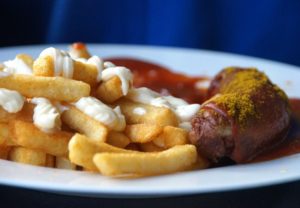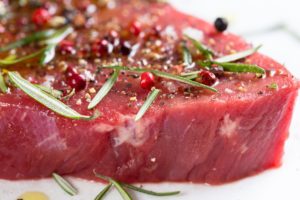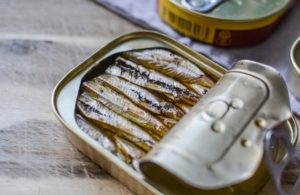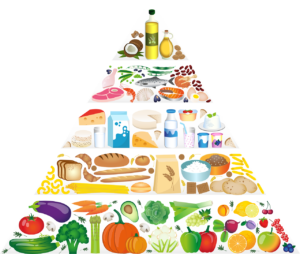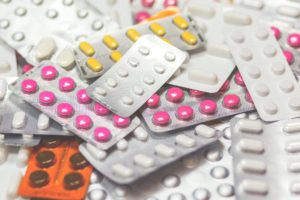The 6 Most Common Mistakes in Nutrition for Endometriosis
The proper diet for endometriosis can alleviate symptoms and enhance overall well-being, whereas an “incorrect” diet can exacerbate pain and inflammation, negatively impacting those with endometriosis. But how can we determine what is “wrong” and “right”? While there are significant research gaps, and the ideal diet for endometriosis varies from person to person, there are certain practices to steer clear of.
This article unveils the 6 most prevalent nutrition mistakes in endometriosis nutrition.
1. Fast Food und industriell hergestellte Lebensmittel essen
It is commonly understood that snacks, industrially produced foods, fast food, and convenience items are detrimental to health. But what exactly makes them so harmful? The culprit is trans fatty acids, which, according to one study, increased the risk of endometriosis by 48%. Furthermore, these fatty acids can escalate inflammation by up to 40%, negatively impact the immune system, disrupt communication in the brain, potentially leading to conditions like depression and Alzheimer’s disease, and even stimulate the growth of endometriosis lesions [6].
Trans fatty acids are generated during the industrial production of hydrogenated fats (often listed as “hydrogenated fats” or “partially hydrogenated fats” on labels) and during the industrial processing (deodorization) of vegetable oils to eliminate their taste and odor. They are also formed during deep-frying to end up in your kitchen. Trans fatty acids can be present in all industrially processed foods, including ready-made meals, snacks (like cookies and commercially baked goods), and fried foods (such as chips and potato chips).
To mitigate these risks, it is advisable to make snacks, convenience foods, and fast food the exception rather than the rule. Instead, cook with fresh ingredients and high-quality, plant-based oils whenever possible.
2. Avoiding Histamine-Rich Foods
Histamine is a natural signaling molecule that can be produced by the body and is also generated in foods during maturation. Histamine promotes inflammation [9] by triggering and accelerating inflammatory responses, including tissue swelling and increased blood flow. Additionally, histamine can influence nerve activity, leading to heightened pain sensation.
Furthermore, histamine is responsible for occasional painful uterine contractions in estrogen hormone production. Consequently, histamine can contribute to increased menstrual pain.
To mitigate these, it is advisable to minimize the consumption of histamine-rich foods: sausages, smoked and aged cheeses, smoked fish, alcohol, soy sauce, fish sauce, wine vinegar, yeast extracts, flavor enhancers, and fermented foods.
3. Limiting Red Meat Consumption
While a vegan diet is not mandatory, it is essential to be aware that consuming red meat can exacerbate pain and inflammation. However, not all meats pose the same level of risk. A comprehensive study involving over 100,000 women [2] revealed that those who consumed more than 2 servings of red meat daily had a 56% higher risk of developing endometriosis than those who consumed red meat less than once a week!
The intake of red meat and sausages also adversely affects specific sex hormones related to endometriosis. Consumption of red meat can lead to heightened estrogen levels, which, in turn, stimulate endometrial growth, increase uterine blood flow, foster inflammation, intensify pain, and influence blood clotting. In the context of endometriosis, red meat is far from beneficial, and there is no compelling evidence to suggest that white meat poses a similar level of harm.
4. Embracing Seafood for Omega-3 Fatty Acids
In the context of endometriosis, reducing the consumption of red meat and many other animal-based foods is advisable. However, there is an exception when it comes to sea fish. Fatty sea fish and red algae offer a valuable source of essential omega-3 fatty acids, specifically EPA and DHA. These 2 omega-3 fatty acids have demonstrated the ability to slow down the growth of endometriosis lesions. Moreover, a separate study indicated that their increased intake (when combined with vitamin B) can help alleviate pain. Simply put, a diet rich in omega-3 fatty acids reduces inflammation and pain associated with endometriosis growths. Therefore, there is a compelling reason to regularly include fish (or red algae) in your diet [1].
5. Avoid Excessive Food Restriction
The internet is flooded with well-intentioned advice on what you “should not” eat to alleviate endometriosis symptoms. If you were to follow all the recommendations, the list of “forbidden” foods could become quite extensive. However, refraining from consuming too many foods can lead to malnutrition, resulting in discomfort and adverse health effects. While it is true that avoiding certain foods, like red meat, can be beneficial, many of these well-intentioned “tips” lack a scientific foundation. For instance, no study demonstrates that consuming animal dairy products accelerates the growth of endometriosis lesions [3]. On the contrary, low-fat dairy products have even been shown to alleviate pain, thanks to their rich calcium and magnesium content [7]. Therefore, when considering omitting foods from your diet, you must base your choices on medical rationale rather than solely relying on internet advice. Another valid reason to eliminate specific foods could be if you are intolerant. Always prioritize how you feel after consuming a particular food, and keeping a food diary can be a valuable tool in this regard.
6. Approach Vitamin Supplements with Caution
Certain vitamins, minerals, and phytochemicals have shown promise in alleviating endometriosis symptoms and potentially slowing or preventing the development and growth of endometriosis lesions. These include antioxidants like vitamins A, C, and E, as well as minerals such as calcium and magnesium, and secondary plant compounds like phytoestrogens and resveratrol. It might seem tempting to address these nutritional needs through dietary supplements, but this approach has its pitfalls.
Regrettably, it is not a sound idea because even with seemingly innocuous over-the-counter supplements, it is surprisingly easy to overdose. The potential harm of excessive dietary supplements is often underestimated. For instance, did you know excessive calcium can lead to cardiac arrhythmias or even a heart attack [4]? That an overdose of vitamin A can be fatal due to increased intracranial pressure [5]? Or that excessive vitamin D can result in organ damage and death [8]?
Prominent institutions such as the Federal Institute for Risk Assessment (BfR), Stiftung Warentest, the Consumer Center, Öko Test, and the German Nutrition Society (DGE) unanimously agree that dietary supplements are entirely unnecessary.
If you maintain a balanced and healthy diet (as discussed in point 5 – Avoid Excessive Food Restriction), there is no need for dietary supplements. On the contrary, they may even pose risks to your health. Focus on consuming ample fruits and vegetables, meet your mineral requirements from sources like mineral water, and fulfill your need for vitamin D by spending time outdoors in fresh air.
By following our nutritional recommendations, you can significantly improve your symptoms. In our endometriosis knowledge database, you will discover a wealth of information on various therapies, including nutrition. Remember, enjoying your meals is still essential!
We wish you great success and … bon appétit!
References
- (PDF) Endometriosis and dietary habits: Can diet make the difference? [Internet]. ResearchGate. [zitiert 2020 Mai 6]. Available at: https://www.researchgate.net/publication/325092608_Endometriosis_and_food_habits_Can_diet_make_the_difference
- YAMAMOTO A, HARRIS HR, VITONIS AF, CHAVARRO JE, MISSMER SA. Eine prospektive Kohortenstudie über Fleisch- und Fischkonsum und Endometrioserisiko. Am J Obstet Gynecol [Internet]. 2018 Aug [cited 2020 Apr 30];219(2):178.e1-178.e10. Available at: https://www.ncbi.nlm.nih.gov/pmc/articles/PMC6066416/.
- Snoj T, Majdič G. MECHANISMS IN ENDOCRINOLOGY: Estrogens in consumer milk: is there a risk to human reproductive health? European Journal of Endocrinology [Internet]. 2018 [cited 2020 May 28];R275-86. Available at: https://eje.bioscientifica.com/view/journals/eje/179/6/EJE-18-0591.xml.
- Reid IR, Birstow SM, Bolland MJ. Calcium and Cardiovascular Disease. Endocrinol Metab (Seoul). 2017 Sep;32(3):339-49.
- Olson JM, Ameer MA, Goyal A. Vitamin A Toxicity. In: StatPearls [Internet]. Treasure Island (FL): StatPearls Publishing; 2021 [zitiert 2021 May 24]. Available at: http://www.ncbi.nlm.nih.gov/books/NBK532916/
- Missmer SA, Chavarro JE, Malspeis S, Bertone-Johnson ER, Hornstein MD, Spiegelman D, et al. A prospective study of dietary fat consumption and endometriosis risk. Hum Reprod. 2010 Jun;25(6):1528-35.
- Harris HR, Chavarro JE, Malspeis S, Willett WC, Missmer SA. Dairy products, calcium, magnesium, and vitamin D intake, and endometriosis: a prospective cohort study. Am J Epidemiol [Internet]. 2013 Mar 1 [cited 2020 May 8];177(5):420-30. Available at: https://www.ncbi.nlm.nih.gov/pmc/articles/PMC3626048/
- Galior K, Grebe S, Singh R. Development of Vitamin D Toxicity from Overcorrection of Vitamin D Deficiency: A Review of Case Reports. Nutrients [Internet]. 2018 Jul 24 [cited 2021 May 24];10(8). Available at: https://www.ncbi.nlm.nih.gov/pmc/articles/PMC6115827/.
- Branco ACCC, Yoshikawa FSY, Pietrobon AJ, Sato MN. The role of histamine in modulating immune response and inflammation. Mediators Inflamm [Internet]. 2018 Aug 27 [cited 2020 Jun 1];2018. Available at: https://www.ncbi.nlm.nih.gov/pmc/articles/PMC6129797/.
- Finding the Perfect Nutritionist: A Step-by-Step Guide - 5. October 2023
- Does Monk’s Pepper Help with Endometriosis? - 5. October 2023
- A Brief Overview of Dietary Fats - 29. September 2023

